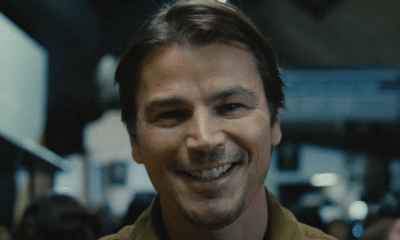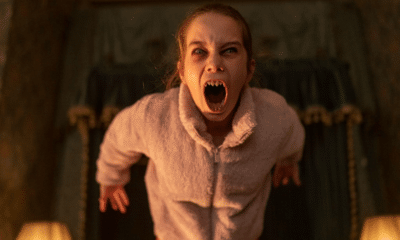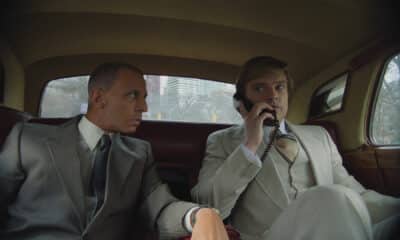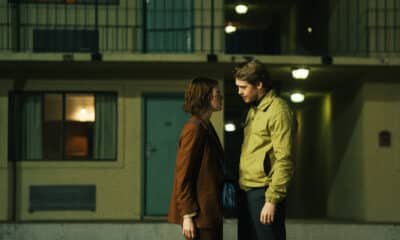There’s a lot of reasons to be excited about The Irishman. Not only is it the latest from maestro filmmaker Martin Scorsese, but it also reunites him with leading man Robert De Niro for the first time since 1995’s Casino. Add to that that it also marks the first time Scorsese has worked with Al Pacino, that is also enticed Joe Pesci out of retirement, and the fact that it’s based on one of the most intriguing true crime stories of the last century, then you can practically hear cinephiles across the world fainting in unison. While the highly anticipated results may just fall shy of Scorsese’s best (at least after first viewing), it still more than delivers, as it ends up displaying a fascinating change of pace for the legendary filmmaker.

The Irishman. Image supplied by Netflix
The film charts the life of Frank ‘The Irishman’ Sheeran (De Niro) a World War Two veteran who became a hitman for the Bufalino crime family, and who may have come to play a very significant part in the disappearance of his close-friend Jimmy Hoffa, the infamous trade union leader with ties to the mob.
Scorsese is, of course, no stranger to big-screen tales of real-life mobsters. With The Irishman, all the ingredients are in place for a trademark Marty Mafia movie, and for the initial stretch it very much plays like one. With an energy very similar to the buzzing atmosphere of Goodfellas, the first act of the film in which we witness a younger Wheeler become closer to the Bufalino’s (namely Joe Pesci’s Russell), the film trades on the hallmarks that we have to expect from a film of this kind. It plays out Frank’s early days as a hitman with a dry dark wit and revels in the ties Frank makes with various individuals of the crime family as he rises from truck driver to trusted enforcer.
It all feels like a bit of a ‘Greatest Hits’ in this initial hour or so, which begins to reshape with the entry of Pacino’s Hoffa. Here the film does become more weighed down by the details of the history it is telling, with Hoffa’s trade union work and the weaving in of other larger historical events of the era, can often feel like a lot to swallow. This is very much eased though by Pacino’s vibrant and volatile performance. He’s the best he has been in years, enlivening scenes with some wonderfully tailored Pacino-outbursts moments that thrive on character interaction, with the scenes he shares with Stephen Graham’s Tony Provenzano standing as some of the film’s tensest and funniest moments.
The friendship between Hoffa and Sheeran is what begins to turn this from a fairly traditional mafia movie into something more distinct. The very genuine kinship that Hoffa and Sheeran share conjures up much conflict in the usually very agreeable Sheeran when it comes to his relationship with the Buffalino’s. Always keen to do right by the crime family that has given him fortune and opportunity, the growing tension that forms between Hoffa and the Buffalino’s leaves Sheeran in the uncomfortable middle ground between his friend and his employers. This man who has killed so many people with ease and little care for the wreckage he may be leaving behind to those close to his victims, is suddenly thrust on the other side of his actions, with his close proximity to Hoffa suddenly provoking an internal conflict beneath Frank’s cool intimidating demeanor.
Related: Full trailer for Martin Scorsese’s The Irishman
It all leads to a final act that becomes characterised by patient reflection, as the ageing Frank becomes pretty much the last man standing, leaving him to dwell on the decisions that he made in his life, namely his involvement in Hoffa’s fate. This section of the film is by far the most engrossing part of Scorsese’s dense epic, as it sees the filmmaker probing deeper into the legacy of the mob archetype at the heart of his story, offering a more melancholy look on the violent acts of such a man. It’s Scorsese reflecting on old age and legacy in a more direct fashion than he ever has before. It’s a filmmaker taking his time to explore melancholy within a genre that he has become greatly associated with. It is quietly some of the most fascinating work he has done this decade.
Much of why this slower, more considerate final third flows so well with the rest of the film is down to De Niro’s presence as Frank. The much discussed de-aging effects may prove a little distracting if you focus on them for too long, but they make a great deal of sense for the narrative. Having De Niro present throughout all the action allows the weight of Frank’s dense history to bare down with all its might on the shoulders of the ageing hitman. Much like Pacino, De Niro delivers his most memorable performance of the decade, carrying the film with an easy-going charisma and ice in his veins. He sparks particularly well with Pesci’s Russell, a character who also brings out the very best in the veteran actor in his welcome return to the screen. Russell’s cooly sinister and dangerously charming demeanour makes him an utterly compelling character, with Pesci making it all look effortless.
Scorsese has constructed a large, sprawling epic here, one that charts history on both a macro and more intimate level. The near three and a half hour running time may seem daunting, but it rarely wastes a minute, only occasionally feeling weighed down by the vastness of its epic narrative. The change in gear going into the final third just about justifies the commitment of time, with new shades of the celebrated filmmaker making themselves known. The fact that Scorsese can still take us by surprise like that is frankly incredible. The Irishman is Scorsese working with what he knows best to express a new level of maturity, ruminating on the significance of legacy and what it means to live with the decisions that you have made along the way.
The Irishman will be released on Netflix on 27th November.

Latest Posts
-


Film Trailers
/ 11 hours agoM. Night Shyamalan’s ‘Trap’ trailer lands
Anew experience in the world of M. Night Shyamalan.
By Paul Heath -


Film News
/ 1 day agoFirst ‘Transformers One’ teaser trailer debuts IN SPACE!
The animated feature film is heading to cinemas this September.
By Paul Heath -


Film Reviews
/ 1 day ago‘Abigail’ review: Dirs. Matt Bettinelli-Olpin & Tyler Gillett (2024)
Matt Bettinelli-Olpin and Tyler Gillett direct this new horror/ heist hybrid.
By Awais Irfan -


Film Trailers
/ 1 day agoNew trailer for J.K. Simmons-led ‘You Can’t Run Forever’
A trailer has dropped for You Can’t Run Forever, a new thriller led by...
By Paul Heath















